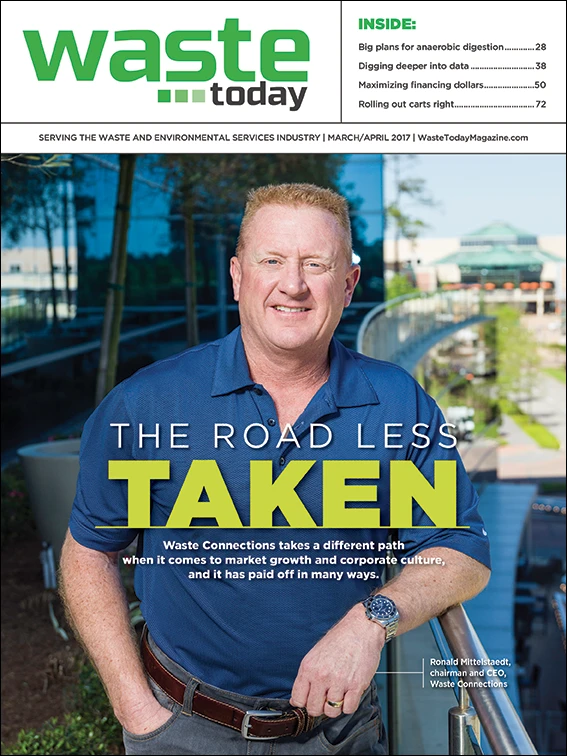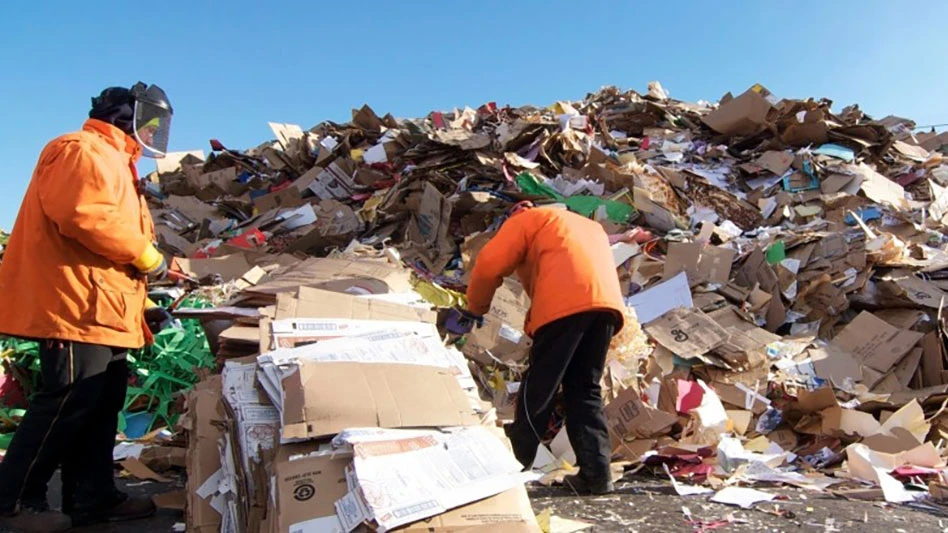
Data tell a story. For the recycling and waste industry, data can help businesses and municipalities improve route efficiency, job productivity and diversion, as well as offer cost savings. They can even open the door for innovative opportunities.
Nate Morris, CEO of Rubicon Global, a cloud-based, full-service waste and recycling company headquartered in Atlanta, understands the value of this information. He says data can help cities that are urbanizing as more robust recycling becomes necessary.
Morris says the data Rubicon collects are preparing cities for the future. “People are flocking to cities, and there’s a tremendous need for more robust recycling plans in hand,” he says. “We’re trying to think about the waste industry 10, 20, 30 years from now and what it should look like.”
Morris continues, “Without the data, you aren’t able to evolve in this new world that’s rapidly approaching us. Our data will allow cities and our customers to be able to be a part of that new transportation process that we see rapidly coming in an autonomous world.”
He refers to the waste and recycling industry today as “archaic,” adding that as technology continues to change the way people work and live, waste and recycling companies must have and use data to evolve.
“You have to have the data,” Morris says. “You have to have a way to digitally connect each aspect of your supply chain to see cradle to grave what’s really happening [and] to understand the investments that need to be made.”
He refers to the big three public companies in the waste and recycling industry—Waste Management, Republic Services and Waste Connections—when he says they have an outdated, asset-heavy business model. Rubicon’s goal is to move away from the landfill-focused model; rather than bury materials, the company seeks new avenues for them. As an example, if data show that one area has 50 tons of organic waste, Morris says building an anaerobic digester to keep that material out of a landfill could be an option.
Data, he says, can help identify these new opportunities. “We have an industry today that makes most of its money by landfilling, and [Rubicon] find[s] that unacceptable,” Morris continues. “It begins with the data and technology. It tells how the material is moving through the supply chain, where it’s going and how to make investments.”
Morris set out in 2008 to start “a 21st century next-generation waste technology company.” Today, Rubicon works with 5,200 independent haulers in all 50 states, with plans to add 20 additional cities to its roster in 2017. Its goal, he says, is to serve as an advocate for independent haulers.
TARGETED TECHNOLOGY
Ramco Environmental, Conway, Arkansas, was one of the first companies to begin using Rubicon’s real-time technology through a pilot program. Launched in 2011 to service the oil and gas industry, Ramco shifted gears in 2014 to the waste and recycling sector once the oil and gas industry in Arkansas slowed down.
Ramco serves industrial and commercial clients in the Midwest and Northeast with six drivers, three front-load trucks, three roll-off trucks and a roll-off trailer.
Jason Ramsey, Ramco vice president of business development, says the company started from scratch. He adds that partnering with Rubicon has proven worthwhile for Ramco’s continued growth.
Since incorporating Rubicon’s cloud-based technology—including downloading Rubicon X, a hauler management system accessed via an app on a smartphone—into its daily operations, Ramco now runs more efficiently, has expanded into new markets and has helped its customers set up programs to divert more materials from landfills. The technology also has helped to identify where Ramco can grow and improve, Ramsey says.
“Some of the smaller companies, they may be skittish of technology because this guy has been doing it for 50 years, and he knows where all of the stops are,” says Lannis Nicholson, Ramco director of business development, solid waste management. “But for companies like Ramco, we want to grow. … The technology piece gives us the ability to talk with our largest customers.”

He provides an example where Ramco tracked how much tonnage a certain customer sent to landfill. After seeing that company’s tonnage increasing for three consecutive months, Ramco offered to set up a program to divert more of its customer’s materials from landfill.
“It’s an eye-opener, and a lot of these companies never had this information before,” Nicholson says. “Let’s say you have a goal to take your tonnage out of the landfill by 25 percent; let us track that for you and do it for you. It really helps us to help the customer, and in return they give us more business.”
Ramco joined forces with Rubicon when the cloud-based waste solutions provider sought a hauler for some locations of a national brand variety store. Ramsey says the company was new to the commercial waste and recycling market at the time, and Rubicon had been working with a small hauler in the central Arkansas area that was reluctant to adopt technology.
Rubicon awarded Ramco the contract after the hauler proved its reliability to Rubicon. Ramco now services 45 of those variety store locations.
“Once we showed them we were responsive, they started sending us a lot more business,” Ramsey says of Rubicon.
Report card
Ramsey says Rubicon’s technology is “a game-changer” because one of the biggest problems haulers have is trying to figure out the most efficient way to run routes. If a new driver is in training, the app allows him or her to see turn by turn how to best drive the route.
Prior to using this technology, Ramsey says drivers were handed a spreadsheet “and we’d say, here’s your 75 customers, now go get them.” It could take up to 14 hours for a new driver to service all of his or her stops, Ramsey says. “With this app, they can do it in seven hours because the GPS knows turn by turn,” he says.Ramsey adds, “Time is money in this business, and we want to make sure we’re running it the most efficient way. This technology has really helped us identify where we need to grow and where we’re not doing a good job.”
He refers to the daily reports Rubicon sends its haulers as being “like a report card.” They give Ramco an idea of where its gaps are. The data also help drivers to meet goals that are set for them. By showing trends week to week and month to month, job productivity has improved.
Rubicon X handles payments among haulers, customers, processors and buyers electronically—another hauler benefit.
Additionally, with paperless information exchange, Ramco’s drivers do not risk their safety by noting pickups in writing.

“The last thing we want our drivers to do is to turn the light on inside their cab and look at a sheet of paper to see where their next stop is,” Nicholson says.
Each time a driver has to fumble with paper and mark off a pickup is another 90 seconds per stop. At 150 stops per day, “That time adds up,” he adds.
Safety also has been enhanced with the hands-free Shake app, which measures proximity, speed and the shaking motion of an emptying bin to confirm service without the driver having to exit the truck. Service stops are recorded in real-time, meaning the driver and customer can see the pickup as it occurs via the app.
Money on the curb
In addition to the benefits Rubicon offers to haulers, cities can improve recycling rates, address issues with residents’ bins and more by using metrics provided through Rubicon’s technology.
Michael Allegretti, head of public policy for Rubicon, says public works departments can gain real-time insights into their communities: Where are recycling rates higher or lower? Which communities are struggling with high contamination? Which areas are having lingering issues with bins? “All of this data is helping public works departments have a more responsive public experience,” he says. “Governments and the public sector should have as good technology and as good systems as the private sector.”
In December 2016, Rubicon began a public-private partnership with the city of Atlanta. The city will use Rubicon’s cloud-based technology platform as part of an initial six-month program.
“It’s going incredibly well,” Allegretti says of the work in Atlanta, where 55 collection trucks are tracked using Rubicon’s technology.
Rubicon most recently launched a public-private partnership with the city of Santa Fe, New Mexico.
Morris says data are the sole reason Paris-based waste and recycling company Suez partnered with the technology company. The two firms say the partnership, which combines Rubicon’s model with Suez’s experience in sustainable resource management, will open the way for the deployment of innovative solutions in the U.S. and European markets.
He explains that much of the reason Suez made the investment in Rubicon was because it wanted to match Rubicon’s data with valuable solutions that are sustainable and landfill-free.
“We’re now developing algorithms where waste diversion is correlated to profit,” Morris says.
He adds, “Until you have that data and transparency about what’s happening, you can’t make decisions and investments, and Suez realized that.”
Recycling is money at the curb, Allegretti says. “Money on the curb only increases when more people are participating in recycling,” he says.
The future of successful recycling programs will rely on statistics, according to Rubicon, and some companies and cities will be more prepared than others.

Explore the March 2017 Issue
Check out more from this issue and find your next story to read.
Latest from Waste Today
- Oregon approves EPR Program Plan
- J.F. Lehman & Co. acquires Atomic Transport LLC
- Mazza Recycling adds to transfer station operations
- Michigan awards $5.6M in recycling, waste reduction grants
- Republic acquires Shamrock Environmental
- Russelectric spotlights paralleling systems for water, wastewater treatment facilities
- Optimized Waste and Logistics North America joins Together for Safer Roads
- LoCI Controls system demonstrates early methane capture success




